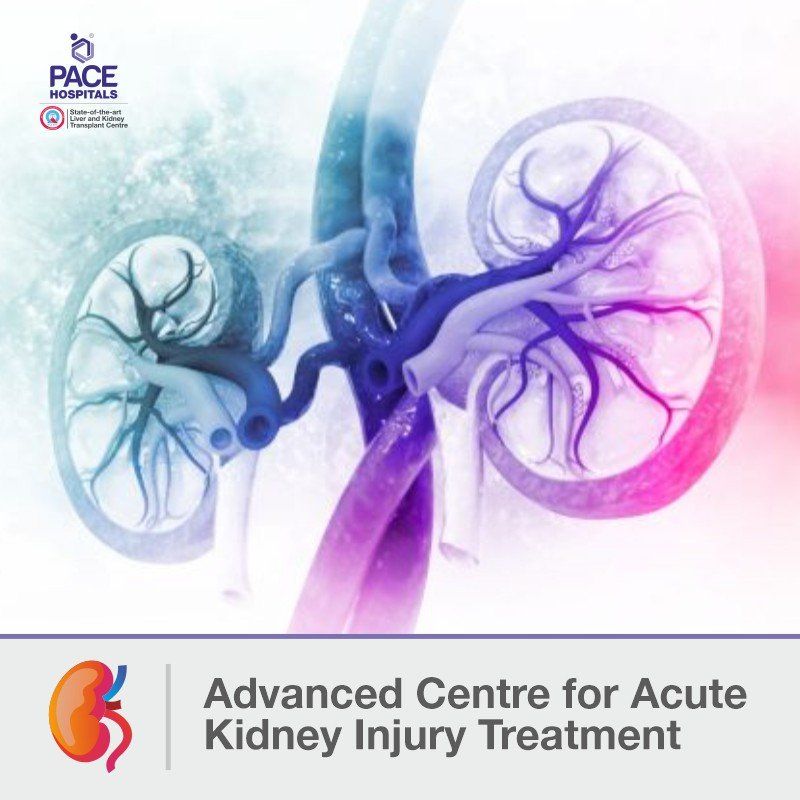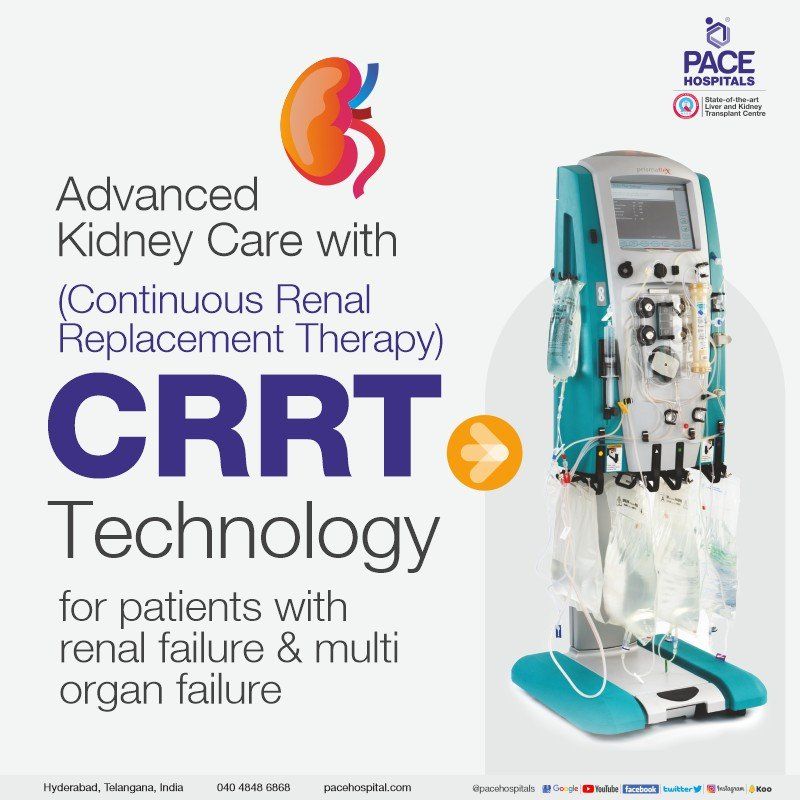Continuous Renal Replacement Therapy (CRRT) | Cost and Benefits
Department of Nephrology at Pace Hospitals is equipped with Continuous Renal Replacement Therapy (CRRT) delivering advanced kidney care to the patients with acute kidney injury (AKI) or acute renal failure (ARF).
Request an Appointment for CRRT
CRRT procedure - appointment
Advanced Centre for Acute Kidney Injury Treatment in Hyderabad with team of Best Nephrologist
At Pace Hospitals, Hyderabad, dialysis facility is available 24 hours. Department of Nephrology is equipped with advanced dialysis machines for providing renal support with continuous renal replacement therapy (CRRT), Slow Continuous ultrafiltration (SCUF), continuous venovenous hemofiltration (CVVH), continuous venovenous hemodialysis (CVVHD), continuous venovenous hemodiafiltration (CVVHDF), intermittent hemodialysis (IHD), prolonged intermittent renal replacement therapy (PIRRT) and Hemoadsorption.
What is Continuous Renal Replacement Therapy (CRRT)?
CRRT full form in medical - Continuous renal replacement therapy
CRRT procedure is a blood purification process used for the patients with acute kidney injury, a sepsis-like syndrome, multi-organ failure, particularly patients who are hemodynamically unstable to support kidney function.
During the CRRT dialysis therapy, the patient’s blood passes through blood purification machine, filter and blood warmer. This blood purification therapy is a slow and continuous process which can run continuously 24 hours a day to remove fluid and uremic toxins from the blood and return the blood back to the patient’s body.
This therapy helps patients with unstable heart rates and blood pressure to tolerate hemodialysis better.
CRRT therapy considered as a life-saving and life-sustaining therapy.
Acute kidney injury (AKI)
Acute kidney injury (AKI), also referred as acute renal failure (ARF) or sudden kidney failure. In this condition kidneys lose its filtration capability this causes waste products accumulation and chemical imbalance in blood such as increased levels of acid, fluid, phosphate and potassium in the body and decreased levels of calcium.
Acute kidney injury or failure develop rapidly and can happen in few hours or few days. Acute kidney injury can happen due to uncontrolled diabetes, low blood pressure, organ failure, bleeding, severe diarrhea, heart attack, heart failure, overuse of pain medicines, severe allergic reactions, burns, trauma, major surgery, cancer, kidney stones, blood clots in the urinary tract, direct damage to the kidneys due to diseases and conditions such as sepsis, multiple myeloma, vasculitis, interstitial nephritis etc.
The glomerular filtration rate (GFR) is preferred diagnosis tool to find out the kidney’s filtration rate in patients with acute kidney injury (AKI) or kidney failure.
Types of CRRT
There are different methods of CRRT that are differentiated by their process of waste removal.
- Continuous Venovenous Hemofiltration (CVVH)
- Continuous Venovenous Hemodialysis (CVVHD)
- Continuous Venovenous Hemodiafiltration (CVVHDF)
Indications of CRRT
There are the most common and less common indications of CRRT for acute renal failure treatment when complicated with any of the following:
Most common indications of CRRT
- Kidney failure with low blood pressure on multiple life supporting medications
- Kidney failure with expansion of the extracellular fluid (ECF) volume refer as volume overload along with severe heart failure
- Kidney failure with acute or chronic liver failure, cirrhosis
- Cerebral edema or brain swelling along with Kidney failure
- An abnormally high metabolic breakdown of a tissue or substance which leads to physical deterioration and weight loss, refer as hypercatabolism
Less common indications of CRRT
- Systemic inflammatory response syndrome (SIRS)
- Sepsis or septicemia
- Multiorgan failure syndrome
- Crush syndrome or traumatic rhabdomyolysis
- Tumor lysis syndrome (TLS)
Benefits of CRRT
Continuous Renal Replacement Therapy (CRRT) is a preferred dialysis therapy and has many benefits to acute kidney failure patients, such as:
- Control of blood pressure
- Balance minerals and acid/base chemicals
- Maintain fluid balance
- Normal electrolytes levels
- Continuous removal of excess fluid and uremic toxins
- Improves survival rate
- Improve chances of complete recovery
Continuous Renal Replacement Therapy - CRRT Cost in Hyderabad, India
The
cost of CRRT in Hyderabad generally ranges from ₹28,000 to ₹65,000 per day (approximately US $340 – US $790 per day). The exact CRRT dialysis cost in India varies depending on factors such as the patient’s kidney function status, duration of therapy required, type of CRRT modality (CVVH, CVVHD, CVVHDF), need for anticoagulation, availability of advanced dialysis machines, critical care requirements, the patient’s comorbid conditions, and the hospital facilities chosen — including cashless treatment options, TPA corporate tie-ups, and assistance with medical insurance approvals wherever applicable.
Cost Breakdown According to Type of CRRT Modality
- CVVH (Continuous Veno-Venous Hemofiltration) – ₹28,000 – ₹45,000 per day (US $340 – US $545 per day)
- CVVHD (Continuous Veno-Venous Hemodialysis) – ₹32,000 – ₹50,000 per day (US $390 – US $600 per day)
- CVVHDF (Continuous Veno-Venous Hemodiafiltration) – ₹38,000 – ₹65,000 per day (US $465 – US $790 per day)
- High-Intensity / Multi-Organ Failure CRRT – ₹45,000 – ₹65,000 per day (US $545 – US $790 per day)
- CRRT with Anticoagulation (Heparin / Citrate) – Add ₹4,000 – ₹8,000 (US $50 – US $95)
Note: CRRT cost per day in India varies depending on the modality used, with charges influenced by filter type, technology, and monitoring needs.
Frequently Asked Questions on CRRT
Is CRRT safe?
CRRT procedure is safe and effective for acute kidney injury patients. Usually, it is a well-tolerated procedure.
Which Is the Best Hospital for CRRT in Hyderabad, Telangana, India?
PACE Hospitals, Hyderabad, is regarded as one of the most reliable centres for advanced renal replacement therapies, including CRRT for critically ill patients with acute kidney injury, sepsis, cardiac instability, and multi-organ failure.
Our multidisciplinary team of nephrologists, critical care specialists, and dialysis technologists provides continuous round-the-clock monitoring to ensure safe, stable, and effective fluid and electrolyte management.
With modern ICUs, high-end CRRT machines, continuous hemodynamic monitoring, and strict infection-control standards, PACE Hospitals ensures high-quality renal care — supported by cashless treatment options, TPA corporate tie-ups, and assistance with medical insurance processing for eligible patients.
What is the difference between CRRT and dialysis?
In hemodialysis, filtration of waste products happens rapidly, and it is done over few hours. But in CRRT due to technical differences with routine hemodialysis it happens slowly and can be done continuously for 24 hours a day and that will lead to more stability in blood pressure during the procedure.
What are the complications of CRRT?
CRRT procedure can have same type of complications like hemodialysis such as low blood pressure, abnormal heart rhythm, allergic reactions, bleeding, blood clotting, hypothermia, fluid balance errors, infections and nutrient losses can occur during CRRT.
How much does CRRT cost in Hyderabad at PACE Hospitals?
At PACE Hospitals, Hyderabad, the cost of CRRT typically ranges from ₹25,000 to ₹58,000 per day and above (approximately US $300 – US $705 per day).
However, the final cost may vary depending on:
- CRRT modality (CVVH / CVVHD / CVVHDF)
- Severity of kidney failure and hemodynamic instability
- Duration of therapy (hours per day / multiple days)
- Need for anticoagulation (heparin / citrate)
- Nephrologist & critical care expertise
- ICU type (medical ICU, cardiac ICU, transplant ICU)
- Additional laboratory tests, imaging, and supportive medications
- Comorbid conditions requiring intensive care
For short-duration CRRT with basic filtration, costs fall at the lower end, while prolonged CRRT with advanced modalities or multi-organ support fall toward the higher range.
After a nephrology consultation and ICU assessment, our specialists provide a personalised treatment plan and a transparent cost estimate tailored to the patient’s critical care needs.
How long does CRRT take?
CRRT dialysis therapy is a continuous process of filtering blood, and it takes 24 hours of time to complete.
Is CRRT the same as hemodialysis?
CRRT is a type of hemodialysis. Routine hemodialysis is a limited hour’s procedure (usually 4 hours) but CRRT name itself suggests that it is a continuous procedure and the technical aspects of the procedure are slightly different from the usual routine hemodialysis. CRRT can run for days altogether continuously.
What is the per day cost of CRRT procedure in India?
Per day average cost of CRRT procedure in India is approximately Rs. 54,500 (fifty-four thousand five hundred only). However, CRRT procedure cost in India may vary depending upon the different hospitals in different cities.
CRRT procedure cost in Hyderabad ranges vary from Rs. 40,000 to Rs. 60,000 (forty thousand to sixty thousand). However, cost of CRRT per day depends upon the multiple factors such as condition of the patient, his lab parameters, life of the filter used and target of the treatment for which it is started initially, hospital, room selection and insurance for cashless facility.






